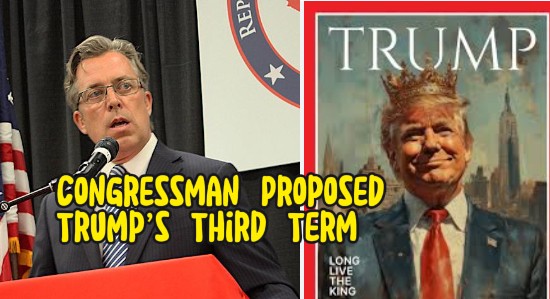Congressman Andy Ogles from Tennessee introduced a House Joint Resolution in January 2025, proposing a constitutional amendment that would allow a U.S. president to serve up to three terms. This initiative is widely seen as an effort to enable former President Donald Trump to seek a third term in office, despite the long-standing two-term limit established by the 22nd Amendment.
The 22nd Amendment, ratified in 1951, was designed to prevent any individual from holding the presidency for more than two elected terms. Andy Ogles’ proposal seeks to overturn this restriction, a move that has sparked both support and intense opposition. While some argue that extending term limits allows experienced leadership to continue in times of crisis, critics see this as a blatant attack on democratic principles and a dangerous step toward authoritarianism.
Laughable Andy Ogles Faces Tough Process of Amending the Constitution
Changing the U.S. Constitution is a notoriously difficult process, designed to ensure that only amendments with broad national support can succeed. There are two primary methods for amending the Constitution:
- Congressional Proposal (Most Common): A proposed amendment must receive a two-thirds majority vote in both the House of Representatives (290 votes) and the Senate (67 votes). Once passed, it must then be ratified by three-fourths (38 out of 50) of state legislatures to become law.
- Constitutional Convention (Never Used): If two-thirds (34) of state legislatures call for a convention, an amendment can be proposed. However, any proposed changes would still need ratification from 38 states.
Given these strict requirements, amending the Constitution is an arduous and politically complex undertaking. Historically, attempts to repeal or significantly alter existing amendments have faced near-impossible odds, making Andy Ogles’ proposal highly unlikely to succeed.
Andy Ogles Blindsided By Political and Legislative Hurdles
The current political climate poses significant challenges to the amendment’s passage. The Republican Party holds only a narrow majority in the House, far from the required 290 votes. In the Senate, where Democrats maintain control, securing the necessary 67 votes is virtually impossible. Even if it miraculously passed through Congress, ratification by 38 state legislatures remains another insurmountable hurdle, given that many states are governed by Democrats or moderate Republicans who would strongly oppose such a measure.
Furthermore, even within the GOP, there is a divide. Many Republican lawmakers are hesitant to back such an amendment, fearing it could set a dangerous precedent that might one day benefit a Democratic president. This internal opposition further weakens the resolution’s chances of advancing beyond political posturing.
Historical and Legal Precedents
No amendment repealing or altering a previous constitutional amendment related to presidential term limits has ever been successful. The 22nd Amendment was introduced in direct response to President Franklin D. Roosevelt’s four-term presidency, with the intention of preventing any leader from accumulating excessive power. The bipartisan support that existed for term limits in 1951 still holds strong today, making any attempt to overturn it an uphill battle.
Additionally, the Supreme Court has consistently upheld the constitutionality of term limits, reinforcing the principle that no single individual should hold excessive executive power. Legal experts widely agree that any attempt to repeal or modify the 22nd Amendment would face not only political resistance but also serious legal challenges.
A Symbolic but Unviable Effort
Ultimately, the proposed amendment by Andy Ogles appears more like a joke or symbolic than practical, serving as a political statement rather than a viable legislative effort. With near-impossible odds of passage, this resolution is likely to fade into legislative obscurity.
For many Americans, the mere introduction of such a proposal is seen as an embarrassment, highlighting the GOP House’s misplaced priorities. Instead of addressing pressing national issues, they are engaging in what critics call a “laughable” and futile attempt to rewrite the rules in favor of one individual.
As the nation moves toward the 2028 election cycle, this effort will likely serve as a rallying cry for Trump loyalists, but its real impact on the constitutional framework remains negligible. The integrity of the U.S. democratic system, built on checks and balances, is unlikely to be shaken by this quixotic attempt at extending executive power.














